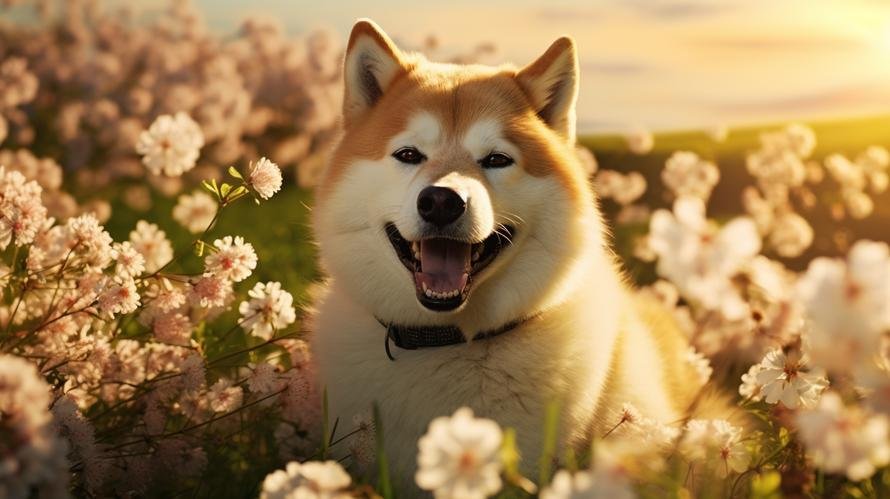Imagine a dog breed that traces its heritage back to the ancient times of Japan, revered for its strength, loyalty, and remarkable hunting skills. This dog was hailed as a symbol of health, well-being, and prosperity, often accompanying high-ranking individuals and noblemen on their adventures. This dog is none other than the Akita!
Now, if you’ve happened upon this article, then chances are you’ve probably heard some rumors about the Akita’s temperament, right? Some people label them as aggressive dogs, quickly dismissing them as an unsuitable option for their families. But is there truth behind this assumption? In a word: maybe.
Why so ambiguous, you might ask? Well, defining the Akita’s temperament as ‘aggressive’ or ‘not aggressive’ is somewhat an over simplification. It is like expectedly labeling humans as ‘friendly’ or ‘unfriendly’ – both can be true, but it all depends on the context, doesn’t it? The outcome is often intertwined with their upbringing, environment, and experiences.
Before we truly delve into the perceived aggression in the Akita, let’s understand where this breed comes from. Originating from the northern mountainous regions of Japan, these dogs naturally had to be sturdy, resilient, and capable of defending themselves and their masters, often against formidable foes like wild boars or bears. Therefore, it should come as no surprise that they have an inherent instinct of self-preservation and protectiveness, which can sometimes be perceived as aggression.
Now, let’s set the record straight once and for all- Akita dogs are not randomly aggressive. They’re not the ‘walking time-bombs’ some people inaccurately depict them as being. However, they are indeed assertive and dominant, unafraid to make their presence felt, which may unnerve those unfamiliar with the breed.
Akitas are naturally vigilant, protective of their family, which makes them excellent guards, watching over their house and loved ones. This protective nature can sometimes lead to situations where they might display aggression towards strangers or unfamiliar dogs, particularly of the same sex.
Nevertheless, this doesn’t mean that Akitas can’t be the sweet, loving companions that you wish for! As with any dog breed, their behavior is significantly influenced by their socialization, training, and upbringing.
What better way to ensure your Akita maintains a calm, sociable demeanor than investing your time into properly socializing them? Start early, introduce them to various sights, sounds, people, and animals. Let them understand that not every unfamiliar aspect of their environment is a threat, and their need to protect is unnecessary in safe environments.
Training an Akita demands firmness, patience, and consistency without resorting to harsh punishment. Remember, the basic rule of dog psychology: dogs respond better to rewards than punishments. So, instead of punishing them harshly for mistakes, reward them for good behavior.
Understanding their body language is also key to preventing aggressive situations. If you notice signs like a rigid body, pulled back ears, intense stare, or baring of teeth, defusing the situation before it escalates is crucial.
As part of their better upbringing, it’s essential to teach your children to respectfully interact with dogs to minimize any chances of aggressive encounters. Kids should not disturb dogs while they’re eating, sleeping, or caring for pups. They should refrain from pulling their ears or tails or engaging in rough play.
Is owning an Akita a walk in the park? Not really. This breed is better suited to experienced dog owners who are comfortable establishing and maintaining a leadership role. However, understanding and embracing these ‘mountain dogs’ for the intrepid, loyal, and loving dogs they are can certainly lead to a rewarding experience like no other.
At the end of the day, the “aggressiveness” of an Akita, like any other dog breed, depends largely on the perspective and their upbringing. With a sense of respect, understanding, patient training, and proper socialization, any fear of aggression can definitely be managed if not completely eradicated.
Isn’t it fascinating how every encounter can be enriched by understanding the perceived “aggression” as merely a character trait shaped by historical necessities? So, when you next think of the Akita, try not to judge them as merely an ‘aggressive’ breed. Instead, appreciate the depth of their legacy, the valiance of their nature, and the immense love and loyalty they hold for their families. After all, they’re much more than meets the eye, aren’t they?



